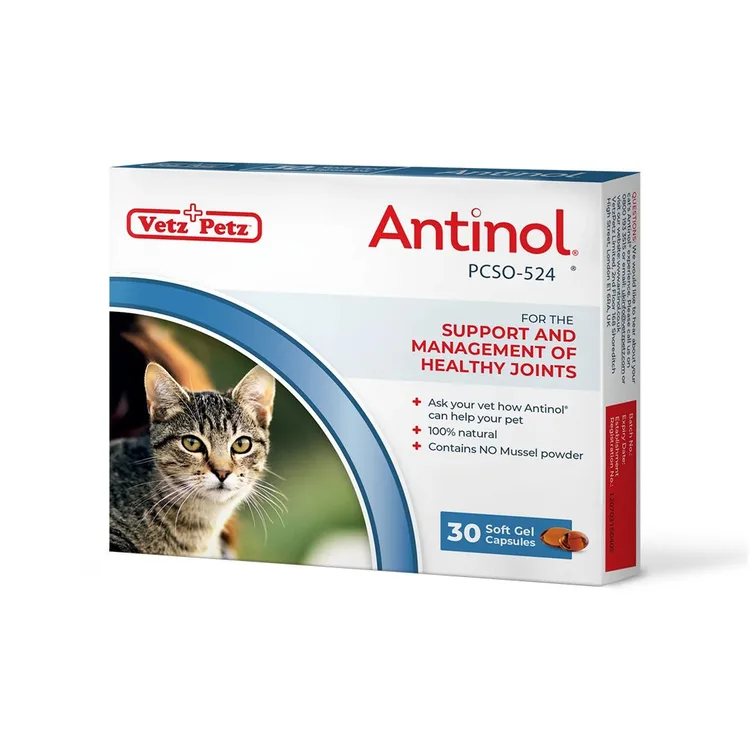Ever wondered if there’s a natural solution to keep your cat active and playful well into their golden years? Meet Antinol for cats—a supplement that’s winning the hearts of pet owners and veterinarians alike for its ability to promote joint health, improve mobility, and support overall well-being. Whether your cat is aging or has been diagnosed with arthritis or joint stiffness, this natural supplement offers an eco-conscious alternative to traditional pharmaceuticals.
In this post, we’ll dive deep into what Antinol is, how it works, and how you can use it to help your cat stay active and happy.
What Is Antinol for Cats?
Antinol is a natural joint health supplement made from marine lipids, derived from a combination of marine oils. The key ingredient is extracted from the green-lipped mussel (Perna canaliculus), which is known for its anti-inflammatory properties. Antinol is often recommended by veterinarians to support mobility, reduce inflammation, and manage joint pain, particularly in cats with arthritis or age-related mobility challenges.
Joint health issues are common among aging cats. Arthritis and joint degeneration can significantly impact a cat’s quality of life, causing pain, stiffness, and reduced mobility. While pharmaceutical treatments like NSAIDs (Non-Steroidal Anti-Inflammatory Drugs) are commonly prescribed, these often come with potential side effects. Antinol offers a natural alternative, supporting joint health without the risks associated with long-term use of synthetic medications.
The Health Benefits of Antinol for Cats
Cats can’t tell us when they’re in pain, so it’s important to notice signs of discomfort, such as difficulty jumping, stiffness after resting, or decreased activity levels. Antinol helps alleviate these issues by providing targeted joint support. Here’s how:
1. Improved Mobility and Reduced Stiffness
The primary benefit of Antinol is its ability to enhance mobility. By reducing joint inflammation, it helps cats move more freely. Many pet owners report noticing their cats becoming more active and playful after starting Antinol, even within the first few weeks.
2. Anti-Inflammatory Properties
Antinol contains potent anti-inflammatory compounds, particularly eicosatetraenoic acid (ETA), which is exclusive to the green-lipped mussel. ETA has been shown to help decrease the production of inflammation-causing molecules, making it effective in managing chronic inflammation in joints.
3. Chronic Pain Management
Cats with arthritis or those recovering from injury often experience chronic pain that can significantly affect their well-being. Antinol helps manage this pain naturally by supporting joint health and minimizing discomfort. Studies have shown that long-term use of marine lipid supplements like Antinol can improve joint function and reduce pain in animals with osteoarthritis.
4. Supports Joint Repair
In addition to reducing inflammation, Antinol supports the body’s natural joint repair processes. By nourishing the joint tissues with essential fatty acids, it helps maintain joint cartilage and reduces further deterioration.
How to Administer Antinol to Your Cat
Giving supplements to cats can sometimes be a challenge, but Antinol is designed to be easy to administer. It typically comes in a soft gel capsule that can either be given whole or punctured and mixed into your cat’s food.
Recommended Dosage
The dosage of Antinol can vary depending on your cat’s weight and specific condition. A general guideline is:
- Small cats (under 11 pounds): 1 capsule per day
- Larger cats (over 11 pounds): 2 capsules per day
It’s important to consult your veterinarian before starting Antinol to determine the appropriate dosage for your cat. In most cases, pet owners notice improvements in their cat’s mobility after 10 to 14 days of consistent use. However, for long-term joint health, Antinol is recommended as an ongoing supplement.

Consistency is Key
To see the best results, it’s important to give Antinol daily without skipping doses. Many cat owners mix the capsule’s contents with wet food to ensure their cats get the full dose. If your cat is a picky eater, starting with small amounts and gradually increasing can help them adjust to the taste.
Potential Side Effects and Safety Considerations
One of the reasons Antinol is so popular among cat owners is that it’s generally well-tolerated. However, like any supplement, some cats may experience mild side effects. The most common side effect is digestive upset, such as vomiting or diarrhea, especially when first introduced to the supplement. If these symptoms occur, try reducing the dosage and slowly increasing it over time.
Is Antinol Safe for Cats?
Yes, Antinol is considered safe for most cats when used as directed. However, it’s always best to consult your vet before starting any new supplement, particularly if your cat has underlying health conditions or is taking other medications. Antinol is also safe to use alongside most prescription medications, but your vet can provide the best advice based on your cat’s specific health profile.
Side Effects
While rare, if your cat experiences persistent side effects such as severe vomiting, diarrhea, or lethargy, stop the supplement and consult your veterinarian.
Eco-Friendly Perspective
For pet owners who prioritize sustainability and eco-friendly products, Antinol aligns with those values. The key ingredients in Antinol are derived from sustainable marine sources, particularly the green-lipped mussels harvested under eco-friendly practices. This ensures minimal environmental impact while supporting marine conservation efforts.
Additionally, Antinol’s packaging is often designed to be recyclable or environmentally friendly, making it a conscious choice for pet owners looking to reduce their carbon footprint.
Eco-Friendly Tips for Choosing Supplements
- Look for supplements made from sustainable ingredients, such as marine oils that are harvested in environmentally responsible ways.
- Choose products with minimal packaging or packaging made from recyclable materials.
- Support companies that emphasize ethical sourcing and environmental responsibility.

FAQs
1. Can Antinol Be Used with Other Medications?
Yes, Antinol is generally safe to use alongside most medications, including pain relievers and anti-inflammatories prescribed by your vet. However, it’s always best to consult your veterinarian to ensure there are no potential interactions.
2. Is Antinol Safe for Kittens or Pregnant Cats?
Antinol is primarily recommended for adult cats with joint issues, but it can be used safely in kittens or pregnant cats under the guidance of a vet. Always consult your veterinarian before giving Antinol to kittens, pregnant, or lactating cats to ensure it’s appropriate for their specific needs.
3. How Long Should Antinol Be Used for Optimal Results?
Antinol is most effective when used as a long-term supplement. While some cats may show improvements within a few weeks, the best results come from continued daily use. For cats with chronic joint issues or arthritis, Antinol can be a permanent part of their wellness regimen.
Conclusion
When it comes to supporting your cat’s joint health, Antinol offers a natural, eco-friendly solution that is both safe and effective. Whether your cat is dealing with arthritis, recovering from an injury, or simply aging, Antinol can help improve their mobility, reduce inflammation, and manage chronic pain—allowing them to stay active and happy well into their golden years.
If you’re looking for a natural supplement to support your cat’s health, Antinol is worth considering. Remember to consult your vet before starting any new supplement and maintain a consistent routine for the best results.
By taking a proactive approach to joint health, you can help your cat enjoy a better quality of life, naturally.



